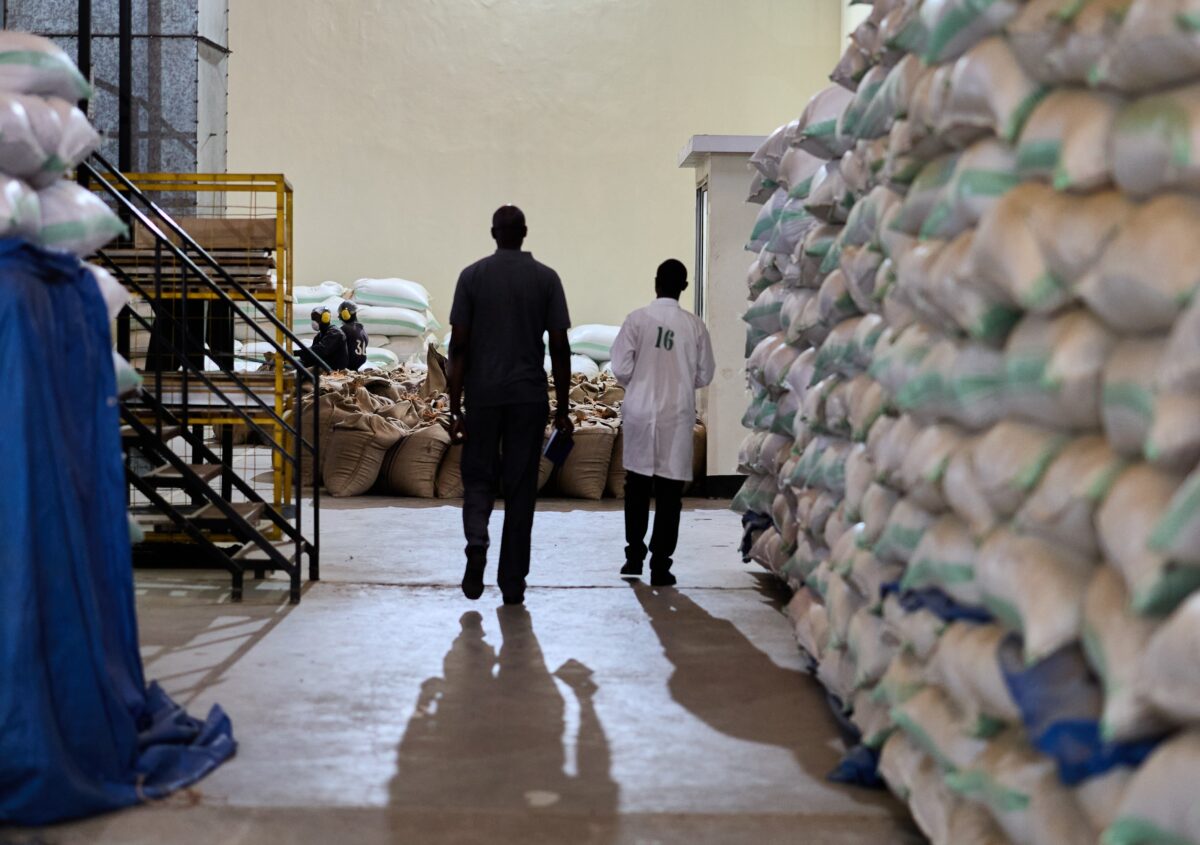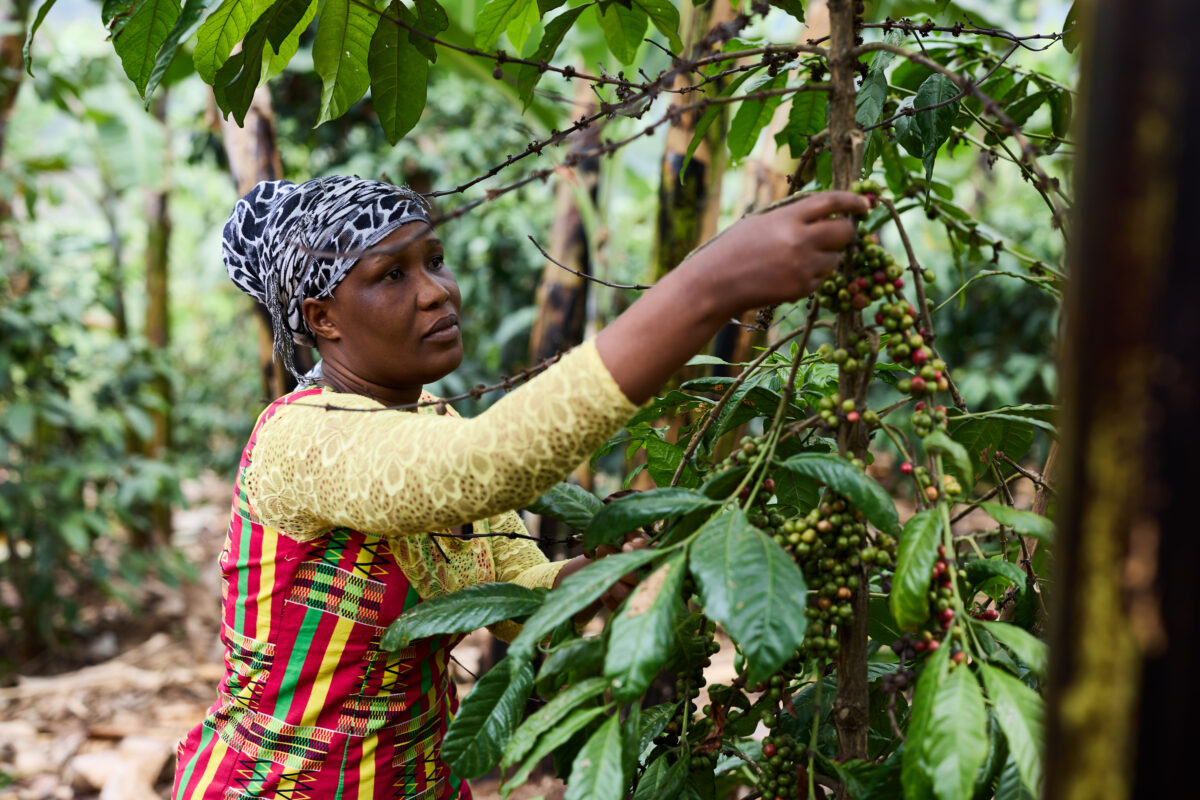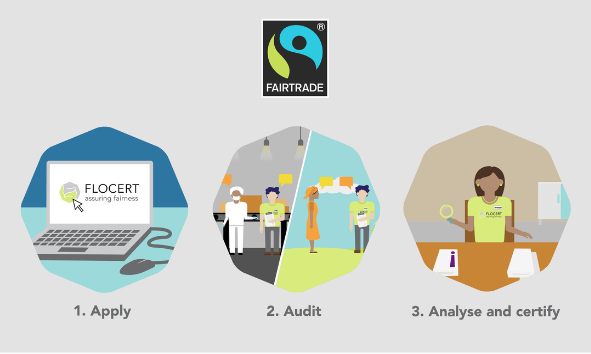Coffee crisis unpacked: 4 questions to Fairtrade and Certification experts on record-high prices
17.04.2025
Arabica coffee prices are at an all-time high, putting significant pressure on all actors in the global coffee supply chain. In light of these extraordinary circumstances, we've invited Andreas Kratz, Director of Global Products, Programs and Policy at Fairtrade International, to share his perspective. Carlos Navarro, FLOCERT's Certification Manager based in Costa Rica, complements these insights with firsthand experiences from the field.
Market instability and its impact on coffee supply chains
Andreas, Carlos, Arabica coffee prices are on a roller coaster – record highs now, but supposedly plummeting at the end of 2025. How does this affect the coffee industry?

AK: The extreme volatility in the market, characterised by record highs followed by sudden drops, is impacting every player in the supply chain. Importers and roasters who purchased coffee at elevated prices earlier this year are now left with expensive inventory as the market declines, making it more challenging to sell those stocks. It is common to see empty warehouses because some participants halted stockpiling due to high prices and uncertain returns. From the Fairtrade perspective, producer organisations that negotiated contracts during peak market periods received better prices, albeit temporarily. However, not all organisations were able to take advantage of this opportunity. Cooperatives with less market access or lower liquidity often miss out. For traders and roasters committed to Fairtrade, we observed increased scrutiny of costs and profit margins, along with a slowdown in contracting new volumes.
We've also noticed a concerning rise in volatile product flows and the emergence of informal trading practices within the market. One significant example is the role of “coyotes,” informal traders operating outside established cooperative frameworks. These individuals often step in with highly enticing cash offers to farmers, thereby diverting substantial volumes of product away from cooperatives. These informal deals frequently undercut cooperative structures and long-term sustainability. In some cases, cooperatives lose traceability and access to pre-financing or services because farmers are lured by immediate liquidity. The implications of these practices are troubling, suggesting a precarious future for farmers and the ecosystems of trade they participate in.
CN: In our producer audits, we at FLOCERT concretely see on the ground what impact the high production costs and low prices have on small-scale producer organisations. Inputs such as fertilisers, pesticides, seedlings, etc. have become more expensive over the years, reducing the profitability of the production chain. On top of this, the producers face the challenge of climate change, which affects the plants and the whole agro-ecosystem, driving up their costs even more.
Fairtrade's response to price volatility
What are the opportunities and limitations of the Fairtrade coffee standard in the most volatile market situation ever?

AK: Of course, Fairtrade is a safety net which remains incredibly valuable during downturns. The Fairtrade Minimum Price and Premium have provided long-term and essential protection in low market conditions. But there are limits to what we can achieve. Fairtrade does not control the global market. If volatility continues at this scale, we all lose if we don't invest in sustainable and equitable supply chains. We certainly lose if ambitious ideas like Fairtrade die on the vine due to underinvestment or disillusionment.
What we need now are joint commitments from all parties involved. Buyers, producers, and certifiers must keep the system strong and credible. We also need to be realistic. Fairtrade is not a silver bullet. It's one part of a much bigger puzzle to make the global coffee trade more resilient and just.
CN: For many of the cooperatives and producers we've interviewed in our audits over the past months, Fairtrade is important, as it gives them access to a Minimum Price in times of low prices, and the Fairtrade Premium which can help them run projects to increase productivity and quality.
While the Standard has become more complex, with new requirements demanding time and resources, putting these requirements into practice is a good opportunity to rethink which is the best way to continue improving.
Fairtrade Certification is also an important way to inform consumers about the conditions of coffee production and show the impact of sustainable production practices on producers, workers, communities, and the environment.
Updates on Fairtrade Pricing
When is Fairtrade updating its Minimum Price?
AK: We've initiated a thorough and comprehensive review of the Fairtrade Minimum Price for coffee, following the review cycle agreed with stakeholders after criticism for not updating the price in over a decade. This new review is part of a commitment to regular, transparent updates, and current high market prices do not directly trigger it.
That's important. The Fairtrade Minimum Price is not designed to follow short-term market trends. It's intended to reflect the cost of sustainable production over the long term. So, this review may or may not change the Minimum Price, but it will strengthen our understanding of costs and realities in different producing countries. We're engaging producers, buyers, and other partners to ensure the outcome reflects real needs. Fairtrade plans to announce its decision regarding the coffee price by March 2026.
Navigating pricing transparently
Coffee traders are also struggling to pay these prices. What is Fairtrade doing about this?
AK: This is difficult for all parties. Many buyers are dealing with liquidity issues. We’ve heard of contract defaults, payment delays, and even bankruptcies. It's a precarious situation. Our main priority right now is ensuring that everyone involved understands the Fairtrade pricing rules clearly. Misunderstandings can cause friction, and that's the last thing we need.
We're working with FLOCERT, as our assurance partner, to make sure that audit procedures are clear and that pricing terms are being applied correctly. Transparency and clarity are essential when tight margins and trust are being tested.
CN: I fully agree on the importance of clarity and transparency. This is why for our audits we recently communicated the exact clarification of rules regarding prevailing differentials to all our auditors and assurance certification analysts: According to the binding interpretation note on requirement 4.1.1 of the Coffee Standard. The key clarification is that negative prevailing differentials can be negotiated between buyers and sellers — if the final price does not fall below the Fairtrade Minimum price and the terms are clearly stated in the contract.
About the authors
 Andreas Kratz
Andreas Kratz
Andreas Kratz is the Director of Global Products, Programs and Policy at Fairtrade International. He focuses on developing product strategies and standards that improve the lives of farmers and workers, addressing sustainable livelihoods, workers’ rights, and climate change. His role also involves creating innovative business models, partnerships, and policies for global advocacy.
 Carlos Navarro
Carlos Navarro
Carlos Navarro is the Certification Manager at FLOCERT, bringing extensive experience from his years as a certification analyst and internal auditor in Fairtrade Standards for producers. Outside the office, he's an avid reader of history and a dedicated mountain biking enthusiast.


